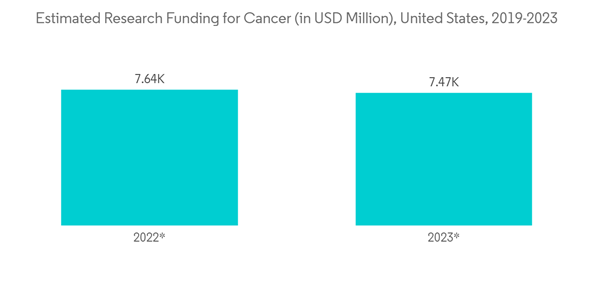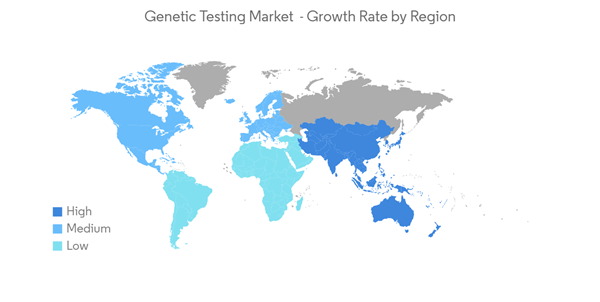The COVID-19 pandemic left a significant impact on the growth of the genetic testing market. According to the data from the March 2021 edition of the Prenatal Diagnosis Journal, the COVID-19 pandemic influenced pregnant women's decisions about prenatal genetic testing. Patients' access to and use of prenatal genetic tests was also impacted by the pandemic. However, genetic testing for COVID-19 diagnosis increased during the pandemic. Hence, COVID-19 had a significant impact on the genetic testing market. However, currently, the genetic testing market has reached pre-pandemic levels in terms of demand for genetic tests around the world and is believed to register healthy growth during the coming years.
Moreover, the increasing technological advancements over the past few years have opened several opportunities for market expansion. The rise in the prevalence of chronic diseases and the development of customized testing kits for niche therapeutic areas are aiding the rapid growth of the market. The increasing focus by governments of various countries to regulate and create awareness regarding genetic tests has successfully resulted in the faster adoption of these tests across the world. The increasing R&D funding, along with the strong market presence by major players in the market, has created a strong entry barrier for new entrants. Innovation in product design, improvement in quality, and strong distribution partnerships are key parameters to retain a competitive edge in the market. For instance, in July 2021, Avellino Labs announced the launch of AvaGen, the genetic eye test, in the United States, which is designed to help determine a patient's risk of keratoconus and other corneal dystrophies. These initiatives by key market players are anticipated to drive the growth of the market.
Additionally, with the development of technology, physicians can perform tests with better accuracy and can look at multiple genetic information at a time. Many countries are facilitating the market penetration of these novel approaches by granting market approvals. For instance, in February 2021, the United States Food and Drug Administration authorized the marketing of the first test to detect a genetic condition known as Fragile X Syndrome (FXS), one of the common causes of inherited developmental delay and intellectual disability.
Thus, the growing burden of chronic diseases, coupled with technological advancements and the inclination toward personalized medicine, is expected to significantly grow the genetic testing market over the forecast period.
Genetic Testing Market Trends
Cancer is Expected to Witness Strong Growth During the Forecast Period
Genetic testing helps identify the risk of various types of cancers that may develop during an individual's lifetime. Genetic tests are available to test inherited variants and mutations in the DNA sequence, which could lead to excessive cell growth and result in tumors or cancer. For instance, genetic testing for the identification of PALB2 (associated with increased risks of breast and pancreatic cancers), CHEK2 (breast and colorectal cancers), BRIP1 (ovarian cancer), and RAD51C and RAD51D (ovarian cancer).The increasing burden of cancers worldwide and the growing awareness among the global population about preventive diagnosis and personalized medicine are the major factors driving the cancer segment during the forecast period. According to the American Cancer Society, in 2021, approximately 1,898,160 new cancer cases and 608,570 cancer deaths were projected to occur in the United States. Additionally, new cancer incidences were estimated to reach 30.2 million by 2040, as per the International Agency for Research on Cancer (IARC). Hence, an increase in the incidence of cancer is expected to contribute significantly to the growth of the segment.
Genetic tests aid in providing information on whether cancer runs in the family and the risk factors associated with the development of cancers in the future among individuals with a family history of cancers. Also, genetic testing is performed in patients who do not respond to chemotherapy to identify the presence of acquired mutations in tumors that are resistant to therapy.
Technological advancements and product launches are expected to drive the growth of the segment studied. For instance, in August 2021, Myriad Genetics launched a polygenic breast cancer risk assessment score, MyRisk Hereditary Cancer test with RiskScore, globally, including in Latin America, validated for women of all ancestries and expanded access to genetic testing. This test makes it easier to understand the current and possible complications of the genetic disorder. Hence, it is widely accepted as a suitable approach for genetic testing. Thus, due to the aforementioned factors, the cancer segment is expected to witness significant growth over the forecast period.
North America Captured the Largest Market Share and is Expected to Retain its Dominance During the Forecast Period
North America dominates the market for genetic testing currently due to the increasing demand for personalized genetic testing services in the region and the rise in the prevalence of chronic and genetic disorders.According to the American Cancer Society's 2022 report, estimated new cancer cases will reach up to 1,918,030 in the United States by the end of 2022. Among all cancers, breast cancer has the highest incidence, with 290,560 cases, followed by lung cancer (236,740 cases), prostate cancer (268,690 cases), and colon cancer (106,180 cases).
According to the Centers for Disease Control and Prevention (CDC), most clinics and hospitals have restricted in-person delivery of non-essential healthcare services, including genetic counseling, to minimize the transmission of COVID-19. However, deferring genetic counseling can impose difficulties because if genetic testing is not performed on time, it will affect the decision-making during pregnancy or cancer treatment. Hence, though the market studied was hampered during the COVID-19 pandemic, the situation is expected to improve gradually.
The increasing product approvals by the US Food and Drug Administration (FDA) and subsequent launches, along with the high concentration of key players involved in research activities for the innovation of novel genetic testing products, are anticipated to drive market growth in North America. For instance, in October 2021, F. Hoffmann-La Roche Ltd launched AVENIO Tumor Tissue CGP Kit, a comprehensive genomic profiling kit to make tailored cancer research more accessible. This kit provides comprehensive genomic profiling of solid tumors from formalin-fixed paraffin-embedded (FFPE) tissue samples. Additionally, acquisitions and expansions are key reasons for the development of the carrier testing segment in Latin America. For instance, in June 2021, Eurofins acquired DNA Diagnostics Center to extend its genetic testing capabilities and join the consumer testing industry. Thus, due to the growing cancer incidence and strategies taken ahead by key players in the region, the genetic testing market is expected to grow significantly over the forecast period in North America.
Genetic Testing Industry Overview
The genetic testing market is highly competitive and consists of several major players. In terms of market share, a few major players currently dominate the market. The presence of major market players, such as Abbott Laboratories, BioRad Laboratories Inc., F Hoffmann-La Roche, and Illumina Inc., is increasing the overall competitive rivalry of the market. The product advancements and improvements in genetic testing platforms by the major players are increasing competitive rivalry.Additionally, the key players are involved in strategic alliances, such as acquisitions and partnerships, with companies that complement their product portfolio to expand their presence globally. In September 2021, MedGenome Labs launched its direct-to-consumer category under the brand name Genessense. It will offer specialized, evidence-based genetic screening tests that can be ordered online through the Genessense website or via e-commerce platforms in the future.
Additional Benefits:
- The market estimate (ME) sheet in Excel format
- 3 months of analyst support
This product will be delivered within 2 business days.
Table of Contents
Companies Mentioned (Partial List)
A selection of companies mentioned in this report includes, but is not limited to:
- 23&Me Inc.
- Abbott Laboratories
- Myriad Genetics Inc.
- Danaher Corporation
- Illumina Inc.
- DiaSorin Spa (Luminex Corporation)
- BioRad Laboratories Inc.
- PerkinElmer Inc.
- Quest Diagnostics Incorporated
- F. Hoffmann-La Roche Ltd
- Eurofins Scientific
- Qiagen NV










